#research outreach
Text
Avoidant Restrictive Food Intake Disorder Research
I am an undergraduate student in the psychology and human development program at Prescott College. I am conducting, alongside Dr. Sebastienne Grant, a research study to investigate avoidant restrictive food intake disorder presentation across socioeconomic status. I’m recruiting individuals to participate in this study. If you are over eighteen years old and interested, please fill out the survey linked below. Once you have completed the survey, I will contact you for additional information and inform you if you have been selected as a candidate; you will also be contacted if you are not selected. If you agree to be a participant, you will be asked to participate in a recorded face-to-face interview for up to one hour. To participate, you should have a working webcam and agree to keep it on for the entire duration of the interview. Interview recordings will be destroyed promptly after the research paper is finalized. In this interview, you will be asked personal questions about your life, experience with ARFID, and other related topics. Your privacy is very important, and all identifiable information disclosed will remain confidential. All identifiable information will be stored in an encrypted file and flash-drive and will not be included in the research report. Your participation in this study is voluntary. There are no repercussions for choosing not to participate in this study. Your participation in this study will help bring more attention and understanding to the experiences and challenges of individuals living with ARFID. Increasing understanding can have positive benefits for not just you but for all people who live with ARFID.
If you are interested, please fill out the survey below, and if you would like more information, please contact [email protected].
#arfid#tw ed sheeran#recovery#research#research participants#research outreach#psychological research#avoidant restrictive food intake disorder#actually arfid#tw arfid#arfid struggles
1 note
·
View note
Text
hot take but like why are we as a society still using lead in manufacturing processes in 2024...
anyway tldr of this is that you are not being exposed to lead unless the circular piece on the bottom of the cup is damaged. so, owning a cup like this will likely not result in lead exposure. this is similar to the fact that in older housing where lead paint has been painted over in subsequent decades, and that paint is in good condition, then it is not a risk. lead based paint only becomes an issue when it is deteriorating (chipping, cracking, peeling, chalking, etc) or being turned into dust during renovation activites. so yeah, in a similar way--you aren't going to get lead poisoning unless the steel compontent on this water bottles comes off.
but also this article says that these lead pellets that are used in the cups are an "industry standard" and i'm like: why? WHY is it industry standard in 2024? at least with lead pipes and lead based paint, we're just dealing with issues from prior decades. but this is current so there is a conscious decision to still use lead in products. also, i don't know enough about this subject (bottle manufacturing) to know why they prefer to use lead for this step, or where in the world they manufacture the cups, but my other concern is that even though the general public will likely not be exposed if it's covered, there are still workers who have to handle it during production.
anyway, i just find that i am constantly learning about more places that lead gets found and it's just. sigh. i know lead has many appealing properties which is why it is constantly found everywhere in everything but at this point it's incredibly clear that no benefits outweigh its risks....
#anyway. assimilating this into brain so that the next time i do public outreach i can answer this question lmao#it pays (quite literally for me) to learn as many of these sources as possible#so now i also get to tell parents they should be careful about their steel tumbler bottles getting damaged...#havent done enough research yet to determine if this is All brands or just stanley & the ones mentioned in the consumer product safety site#but it seems to be a common component of steel insulated bottles#will have to do more research later
67 notes
·
View notes
Text
To the kids currently going through abuse from their parents, keep pushing forward. You will get out. You will. It feels huge, it's a lot to think about. You will probably make mistakes. But there is not a single living independent adult that hasn't made mistakes in handling their finances, taking care of themselves, etc. The sooner you get out, the sooner you can start to learn who you are when you aren't being abused, and that self is deeply worth knowing. You are worth the effort.
#I don't say this lightly. I was homeless for a while. It was absolutely horrible.#But going homeless let me travel to the other side of the country in my car. I lost a lot but I've gained everything.#Research where you go next#What the cities are like and if there's support for you nearby#LGBT outreach or community mental health outreach programs are excellent#I don't advocate going homeless because being homeless and not knowing of you'll eat again is horrible.#But if it happens to you get to a library and see what outreach is in the area.#The hardest part is getting an apartment of your own cause shits expensive. And work is hard when you've got trauma#My tip for that#Is that you can qualify for more work than you think.#If retail feels like it's peeling your skin off then apply for office positions over and over again until something picks you up#It might take months. Don't lose heart if it does.#You deserve better. Keep pushing for things to be better#Being a young adult is hard. Being a kid is hard. Older folks can be really dismissive and unkind.#And im sorry for how people will underestimate you.#Try to get food stamps if your struggling financially. And Medicare. The state makes is horribly difficult to get on either thru#The sheer beurocracy of it#If the deny you#Appeal it.#Sometimes appealing is as simple as showing up#But it helps to have some key points written down in case you need to defend yourself.#It sounds scarier than it is.#If you have an anxiety disorder I know that's not much comfort#But as someone who has been an abused child and managed to navigate out of that awful situation#Despite the adversity you will likely face#You have a bright future ahead of you.#The healing will be the hardest part#But you are worth every moment#I sincerely wish the best for you.#And I hope you don't face as much adversity as I did.
9 notes
·
View notes
Note
bestie you ok, just checkin because i've noticed you haven't posted in 2 days /srs
can y’all not see the posts? everyday has a countdown posted around 12am every day (my time) (i do schedule them. i’m not staying up that late)
#i’m looking and i’m not seeing any days i missed#am i crazy#i do very much appreciate the concern though besticle#i am doing well. very busy#i’m currently writing a research project about#mmiwg2s#and how they use social media for outreach#not a countdown#ask response#slay#i know the tumblr gods hate my posts because they’re like bad for advertising so maybe follow one of the tags on the countdowns#that may help#tags like#did the king die yet or countdown or king charles iii
71 notes
·
View notes
Text
whatever career I end up in, I need it to be one where I don't have to be creative. I am way too dumb to be making fun and educational posters, let me just write an essay and pin that to the board instead
#//juri speaks#laying on the floor; suffering; dying; etc#very firmly crossing ''outreach and student engagement'' off my list of library domains i might like to work in#also trying not to worry about the far off probably-wont-happen-anyway plans for more degrees falling apart#bc i fear i wont be creative enough to gen up some original research idea#all im good at is following procedures to the fucking letter#and thats not the kind of person anyone wants to hire unless they're the military 😭#everyone just wants creative self starting go-getters and i have too many fuckin mental eels for that shit#anyway this has been your ''it's rainy and im sad'' mental breakdown of the day#now back to your regularly scheduled other posts made by people capable of doing things
3 notes
·
View notes
Text

Observations of real snowflakes from Ny-Alesund (Svalbard, Norway), Hyytiälä (Finland), Gothic (Colorado, USA), and on the sea ice close to the north pole (during the MOSAiC expedition). Collage of images obtained with the Video In Situ Snowfall Sensor (VISSS, Maahn, M., Moisseev, D., Steinke, I., Maherndl, N., and Shupe, M. D.: Introducing the Video In Situ Snowfall Sensor (VISSS), EGUsphere [preprint], https://doi.org/10.5194/egusphere-2023-655, 2023.); recolored.
#science#research#phd#outreach#science communication#scicomm#snow#snowflakes#snowfall#observations#ice#winter#ice crystals#ice cold#photography#cold#finland#hyytiälä#nyalesund#svalbard#norway#field campaign#outdoors#gothic#colorado#north pole#north#mosaic#polar#frozen
3 notes
·
View notes
Text
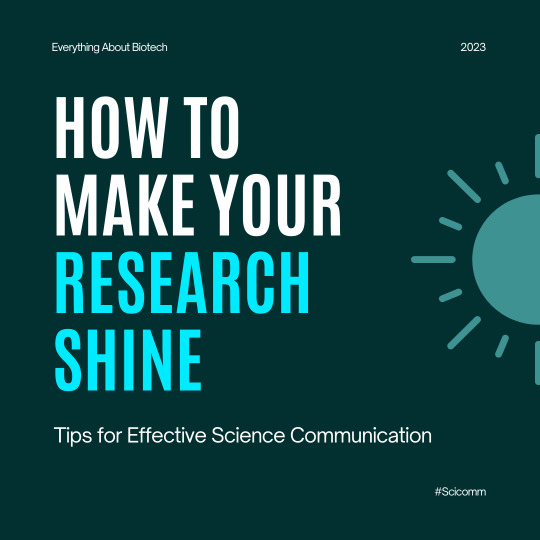
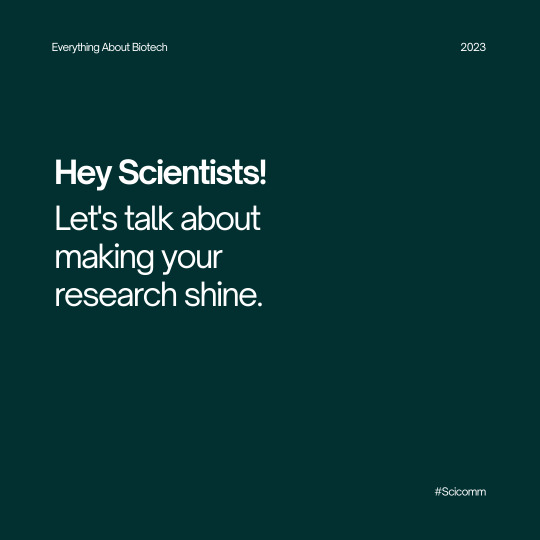
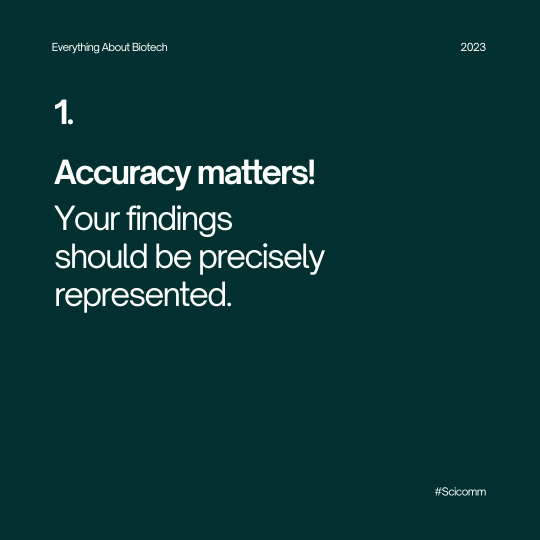
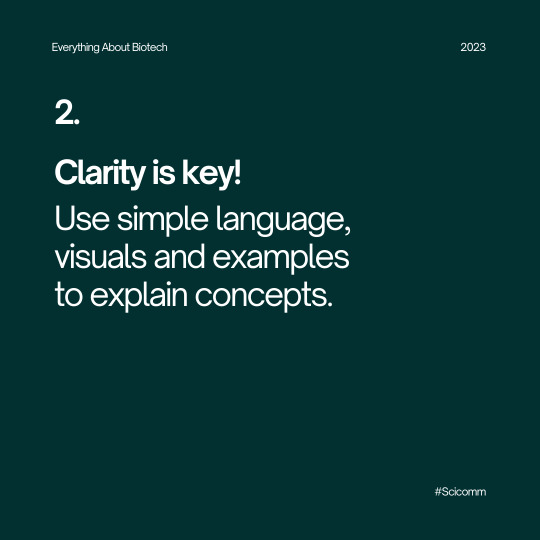
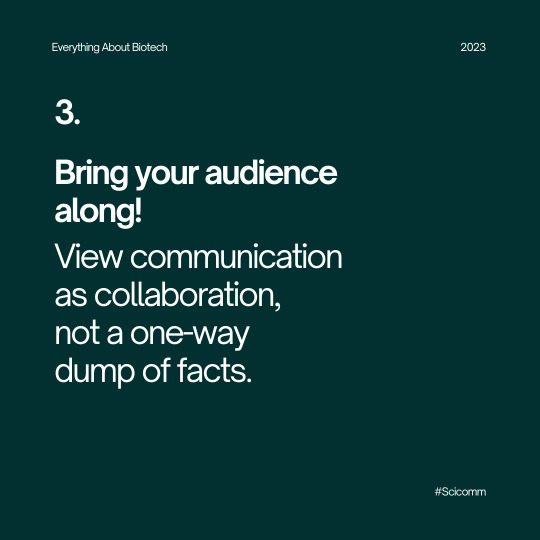
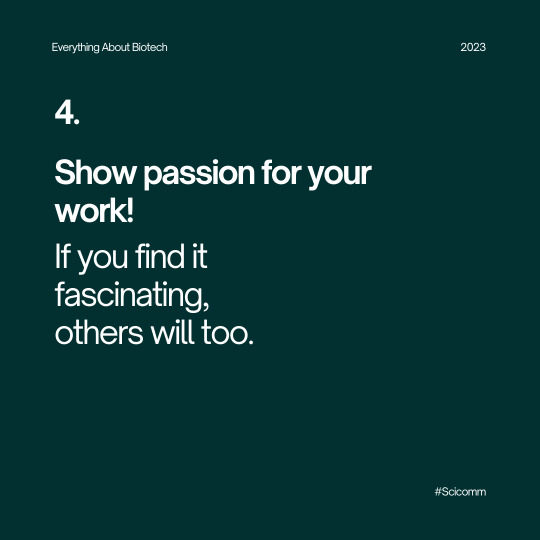
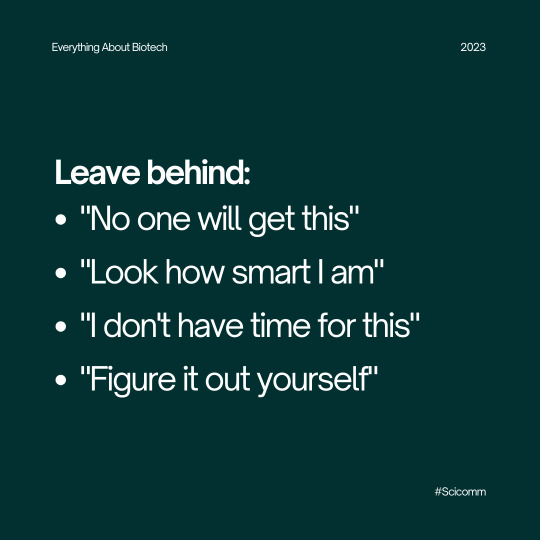
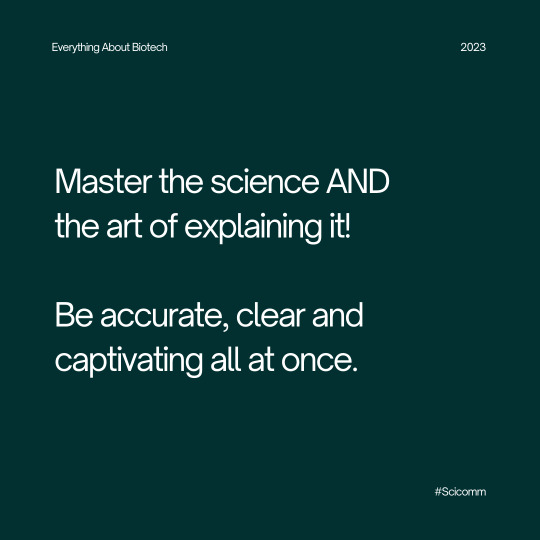
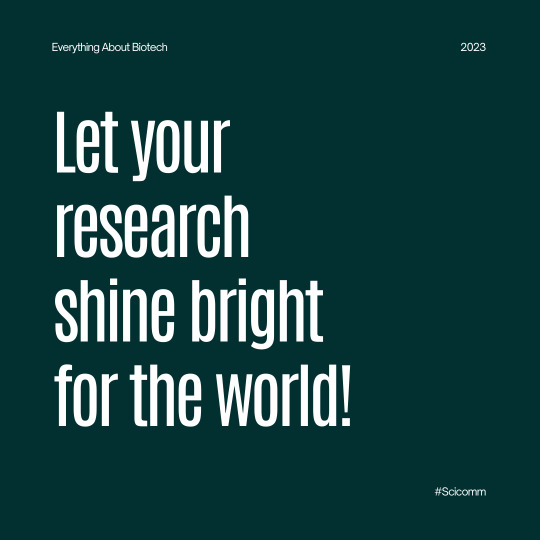
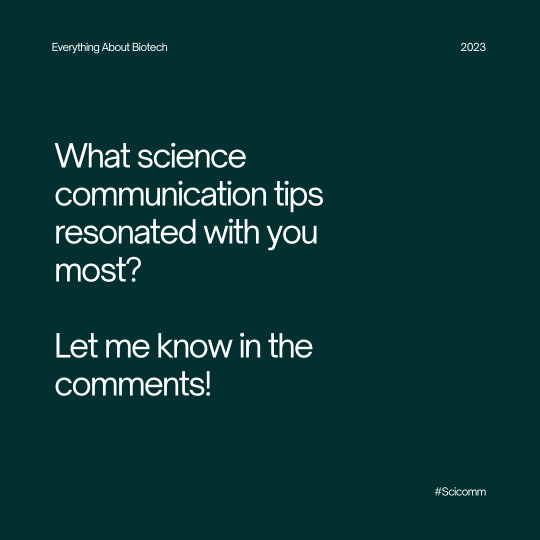
Hey scientists, learn how to make your research shine! 🤩
In this post, we share tips for accurately and clearly conveying complex concepts to broad audiences.
Learn how to move beyond jargon, engage your readers, and bring passion to difficult subjects. Whether you're creating content for social media, presentations, or journal articles, these tips will help you explain your work with style. Master both the science and the art of communication!
Let us know: which tips resonated most with you? How do you make your research shine? Share this post with fellow scientists and students who want to turn their findings into captivating and accessible content!
#scicomm#science#scientist#research#STEM#sciencetranslation#publicscience#plainlanguage#dataviz#infographics#facts#accuracy#credibility#engagement#outreach#simplifyingscience#scientificliteracy#understanding#comprehension#clarity#examples#analogies#visualaids#captivating#fascinating#intriguing#masteringboth#scientificart#scienceshine#PhDlife
4 notes
·
View notes
Text
Czech scientist discovered the working mechanism of a miraculous antibiotics that can kill even the gold staphylococcus
This is the title of an interview that I did about my antibiotic research for a Czech magazine HROT. Full interview article here.
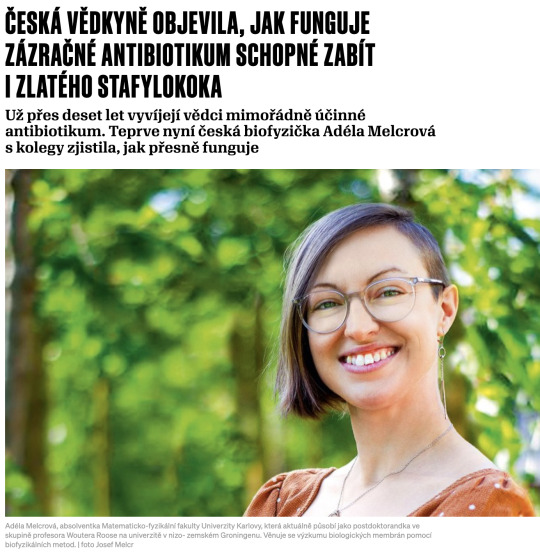
I was really happy about this. I want people to know what we researchers are doing. But what I did not expect was email along these lines:
Dear Dr. Melcrová, I read your article in the magazine. I am suffering from staphylococcal infections for many years. Could you help me?
...I was in quite a shock. How should I reply? I am not a medical doctor. And my research is not yet approved for clinical practise. It's tough.
#science#research#outreach#interview#newspaper#magazine#patients#unexpected#antibiotic#disease#trying to help#original content
6 notes
·
View notes
Text
youtube
Ever wondered what clouds are made of? How they impact the Earth‘s climate? And what’s special about clouds in the Arctic? ❄️
#science#education#climate#climate change#climate crisis#arctic#clouds#researchers#ice crystals#water#snow#snowflake#snowfall#science is cool#earth#space#video#outreach#science education#winter#Youtube#nasa#satellite
2 notes
·
View notes
Text
People think all scientific research is done on these fancy but incomprehensible machines and data is always presented as modern, advertising-level graphics... When really it's mostly somebody's homemade program with no UI run through linux shells, 90's and 2000's era government databases, Pepe Silvia stringboards and confused silence from colleagues, everyone using the one computer that actually has a license to the only good statistics and graphing program, and sharpie marked diagrams and taped into $2 comp notebooks
#science#research#science outreach#mars speaks#photos from work just look like photos from a slightly cleaner biosafety equipped garage
4 notes
·
View notes
Text
youtube
Here is one of my new ventures, a weekly video podcast on YouTube. In this episode, I introduce the series and discuss the other new venture, Branch Tales.
Enjoy!
#genealogy#family history#research#ancestry#shovlin#ireland#roots#finding your roots#podcast#youtube#son of swift#new venture#outreach#Youtube
1 note
·
View note
Video
Educational Services Staff with a Spacemobile Vehicle by NASA on The Commons
Via Flickr:
Members of NASA's Lewis Research Center’s (now NASA Glenn) Educational Services Office pose with one of the center’s Spacemobile space science demonstration units. Unlike its predecessor, the NACA, the new NASA space agency considered public outreach one of its core tenets. The early astronauts were lionized and new technologies touted. Lewis, which had previously been a closed laboratory, began hosting open houses and elaborate space fairs in the early 1960s. In addition, the center initiated educational programs that worked with local schools and a robust speaker’s bureau that explained NASA activities to the community. One aspect of these efforts was the Spacemobile Program. These vehicles included a delegated speaker, exhibits, models, and other resources. The Spacemobiles, which made forays across the Midwest, were extremely active throughout the 1960s. NASA Media Usage Guidelines Credit: NASA Image Number: GRC-1964-C-72829 Date: November 1, 1964
0 notes
Text
doing a presentation is all fun and games until you realize you need 5 slides of background information for two brief slides of methods and results
#it's become less of a research presentation and more of a scicomm/outreach talk... sorry for trying to be thorough I guess ;-;#hopefully I can do a more technical one at the astro symposium in october. knock on wood.#research stuff
1 note
·
View note
Note
harris is not a cop and biden is not a rapist, go do ur research instead of getting all ur info off tiktok for once
do you want trump to win or not?! jesus christ
This is one of the funniest asks I’ve ever gotten solely for the fact that you accused me of having TikTok, I’m almost tempted to wake up my very loving fiancé and see if they get a kick out of this considering how much I have vocally hated that app since the first days of its ungodly existence.
Please give me your best advice as to how I, a Ph.D. candidate entering my fifth year, can do research. Dying to pick up your tips 🤣
#ask#anon#’do you want Trump to win or not?#perhaps you could ask the dnc that#i love dem voter outreach i really do#insulting the people you’re trying to get onto your side#telling them to do research while you ignore basic facts laid out in their bio#cracking up#i actually was considering voting for harris but this ask is pushing me toward ‘no’ just so you’re aware
1 note
·
View note
Text
youtube
John Ross was super close to discovering the entrance to the Northwest passage, but he mistook clouds for mountains and turned his ships around. Learn more in my new Youtube video! ❄️
#north#north pole#outreach#phd#research#scicomm#science#science communication#arctic#polar#polar history#arctic history#arctic exploration#arctic expedition#Youtube
2 notes
·
View notes
Text
“The dance between autonomy and affinity creates morality”
New Post has been published on https://thedigitalinsider.com/the-dance-between-autonomy-and-affinity-creates-morality/
“The dance between autonomy and affinity creates morality”


MIT philosophy doctoral student Abe Mathew believes individual rights play an important role in protecting the autonomy we value. But he also thinks we risk serious dysfunction if we ignore the importance of supporting and helping others.
“We should also acknowledge another feature of our moral lives,” he says, “namely, our need for affinity or closeness with other human beings, and our continued reliance on them to live flourishing lives in the world.”
Philosophy can be an important tool in understanding how humans interact with one another, he says. “I study moral obligation and rights, how the two relate, and the role they have to play in how we relate to one another,” Mathew adds.
Mathew asks that we think of autonomy and affinity as opposing forces — an idea he attributes to MIT philosopher, professor, and mentor Kieran Setiya. Autonomy pushes people farther from us, and affinity pulls people closer, Mathew says.
“The dance between autonomy and affinity creates morality,” Mathew adds.
Mathew is investigating one of moral philosophy’s foundational ideas — that every obligation we owe to another person correlates to a right that they have against us. The “Correlativity Thesis” is widely taken for granted, he says.
“A common example that’s used to motivate the Correlativity Thesis is a case of a promise,” Mathew explains. “If I promise to meet you for coffee at 11, then I have a moral obligation to meet you for coffee at 11, and you have a right to meet me at 11.” While Mathew believes this is how promising works, he doesn’t think the Correlativity Thesis is true across the board.
“There isn’t necessarily a one-to-one relationship between rights and obligations,” he says.
“We need folks’ help to do things”
Before coming to MIT, Mathew majored in philosophy and minored in ethics, law, and society as an undergraduate at the University of Toronto. Upon graduating in 2020, he was awarded the prestigious John Black Aird Scholarship, given each year to the university’s top undergraduate.
Now at MIT, Mathew says his research is based on the value of shared responsibility.
“We need folks’ help to do things,” he says.
When we lose sight of moral values, our societal connections can fall away, he argues.
“Mutual cooperation makes our lives possible,” Mathew says.
His research suggests alternatives to the idea that rights demand obligations.
“Morality puts a certain kind of pressure on us to ‘pay it forward’ — it requires us to do for others what was once done for us,” Mathew says. “If we don’t, we’re making an exception of ourselves; in essence, we’re saying, ‘I was worthy of that help from others, but no one else is worthy of being helped by me.’”
Mathew also values the notion of paying it forward because he’s seen its value in his life. “I’ve encountered so many people who’ve gone above and beyond that I owe them,” he says.
A valuable social compact
Mathew has been extensively involved in “public philosophy.” For example, he’s organized public events at MIT, like the successful “Ask a Philosopher Anything” panel in the Stata Center lobby.
Mathew’s work leading the local chapter of Corrupt the Youth, a philosophy outreach program focused on bringing philosophy to high schools students from historically marginalized groups, is an extension of his belief in our shared responsibility for one another — of “paying it forward.”
“The reason I discovered philosophy was because of my instructors in college who not only introduced me to the subject, but also cultivated my enthusiasm for it and mentored me,” he says. “Our moral theorizing should take into account the kinds of creatures we are: vulnerable human beings who are constantly in need of each other to get by in the world.”
Morality, Mathew says, gives us a tool — the social practice of forgiving — through which we can coexist, repair relationships we damage, and lead our lives together.
Mathew wants moral philosophers to consider their ideas’ practical, real-world applications. His experiences derive, in part, from notions of moral responsibility. Those who’ve been given a lot, he believes, have a greater responsibility for others. These kinds of social systems can consistently be improved by paying good deeds forward, he says.
“Moral philosophy should help build a world that allows for our mutual benefit,” Mathew says.
#applications#board#coffee#college#dance#Ethics#Events#extension#Graduate#postdoctoral#how#human#humans#Ideas#it#law#life#mit#namely#Notion#One#Other#outreach#Philosophy#Play#Profile#relationships#Reliance#repair#Research
0 notes
